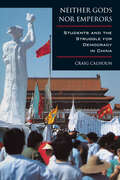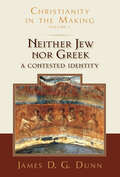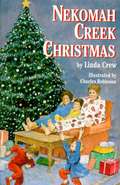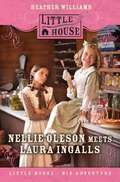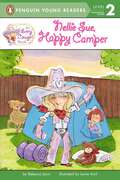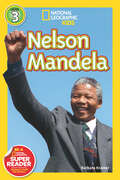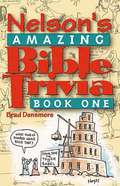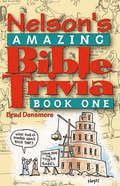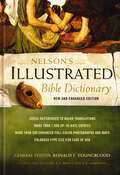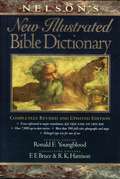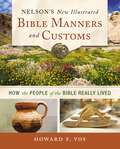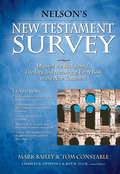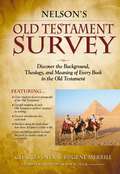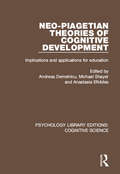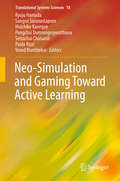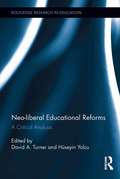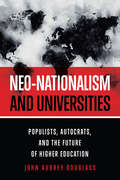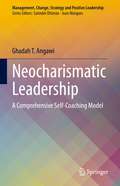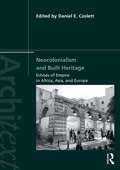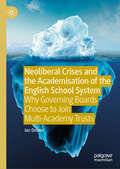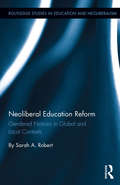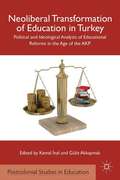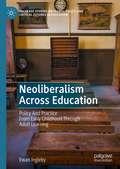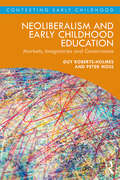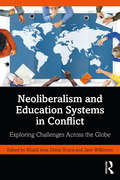- Table View
- List View
Neither Gods nor Emperors: Students and the Struggle for Democracy in China
by Craig Calhoun"We want neither gods nor emperors", went the words from the Chinese version of The Internationale. Students sang the old socialist song as they gathered in Beijing's Tiananmen Square in the Spring of 1989. Craig Calhoun, a sociologist who witnessed the monumental event, offers a vivid, carefully crafted analysis of the student movement, its complex leadership, its eventual suppression, and its continuing legacy.
Neither Jew nor Greek: A Contested Identity (Christianity in the Making, Volume 3)
by James D. DunnThe third and final installment of James Dunn's magisterial history of Christian origins through 190 C.E., Neither Jew nor Greek: A Contested Identity covers the period after the destruction of Jerusalem in 70 C.E. through the second century, when the still-new Jesus movement firmed up its distinctive identity markers and the structures on which it would establish its growing appeal in the following decades and centuries. Dunn examines in depth the major factors that shaped first-generation Christianity and beyond, exploring the parting of the ways between Christianity and Judaism, the Hellenization of Christianity, and responses to Gnosticism. He mines all the first- and second-century sources, including the New Testament Gospels, New Testament apocrypha, and such church fathers as Ignatius, Justin Martyr, and Irenaeus, showing how the Jesus tradition and the figures of James, Paul, Peter, and John were still esteemed influences but were also the subject of intense controversy as the early church wrestled with its evolving identity. Comprehensively covering an important, complex era in Christianity that is often overlooked, this volume is a landmark contribution to the field.
Nekomah Creek Christmas
by Linda CrewRobby Hummer loves everything about Christmas except the school play. He dreads being an elf in green tights.
Nellie Oleson Meets Laura Ingalls
by Heather WilliamsNellie Oleson does not like living in Walnut Grove. It's dirty and dusty and full of poor farmers. One day a new girl, Laura Ingalls, comes to school. Laura's dress is too short, she doesn't wear shoes, and she lives out on the lonely prairie. But everyone wants to be Laura's friend. Nellie doesn't understand: If she's the prettiest and richest girl in Walnut Grove, shouldn't she be the most popular? Nellie will do anything to get Laura Ingalls out of her life, and one day her wish comes true. Something terrible does happen, but not just to Laura Ingalls--it happens to the entire town of Walnut Grove. Laura Ingalls Wilder's classic story On the Banks of Plum Creek introduced readers to Nellie Oleson. Now readers will see events unfold from Nellie's perspective in Nellie Oleson Meets Laura Ingalls, which is an enchanting and eye-opening look at Laura Ingalls's prairie foe.
Nellie Sue, Happy Camper: An Every Cowgirl Book (Every Cowgirl)
by Rebecca JanniLike all adventurous cowgirls, Nellie Sue loves to go camping--and it's time to try her skills in the wild outdoors. But, when night falls and the woods come alive with creaking noises, these happy campers aren't so happy anymore! Nellie Sue must use her biggest cowgirl courage to make it through the night with a smile on her face.With playful, simple text and a super sweet ending, this Level 2 reader is a perfect choice for children beginning to read.
Nelson Mandela (Readers Bios)
by Barbara KramerNelson Mandela, who courageously dealt with adversity and emerged a world leader, has been an inspirational role model for millions of people around the world, from students to presidents. After being imprisoned for 27 years, in 1994 he became South Africa's first democratically-elected president and shared the Nobel Peace Prize. Mandela died in 2013, but his legacy lives on as a barrier-breaker and humanitarian. Learn all about his life, especially the challenges he faced and how he persevered, in this thoughtful biography.
Nelson's Amazing Bible Trivia
by Brad DensmoreThink the Bible is boring? Think again! Brad Densmore is the author of A Funny Thing Happened On My Way Through the Bible. He is married and currently teaches speech and writing at a community college in Michigan.
Nelson's Amazing Bible Trivia
by Brad DensmoreHave fun learning over 5,000 curious and interesting facts about the Bible with this trivia book from Brad Densmore. Quiz yourself, Bible study groups, and Sunday school classes with questions from every book of the Bible. Be entertained while you increase your knowledge of people, places, stories, quotations, and God's teachings. Features include: Puzzles Multiple choice questions Top ten lists Answer keys Illustrations
Nelson's Illustrated Bible Dictionary: New and Enhanced Edition
by Ronald F. YoungbloodThe most comprehensive and up-to-date Bible dictionary available. With a fresh new look and updated photographs, this new and enhanced edition is a wealth of bible study information for any level of study. It includes more than 7,000 entries, plus more than 500 full-color photographs, maps, and pronunciation guides.Features include:Cross-references to all major translationsMore than 7,000 up-to-date entriesMore than 500 full-color photographs and mapsEnlarged type size for easier readingVisual Survey of the Bible from The Open Bible
Nelson's New Illustrated Bible Dictionary
by Ronald YoungbloodThe premier Bible dictionary - now in a limited edition deluxe gift format.
Nelson's New Illustrated Bible Manners and Customs: How the People of the Bible Really Lived
by Howard VosThe most comprehensive, up-to-date, accurate information on life in Bible times available in one volume for the general reader.
Nelson's New Testament Survey
by Mark BaileyEach book of the New Testament is introduced and investigated with scholarship and biblical faithfulness. Includes all the information usually found in a Bible handbook - author, date, historical background, purpose, outline - but it goes much further. The authors provide an exposition of every passage in the New Testament, written in contemporary, understandable language. Sidebars and inserts offer other valuable reference material such as lists of the parables of Jesus, the miracles of Jesus, and key theological principles.
Nelson's Old Testament Survey: Discovering the Essence, Background and Meaning About Every Old Testament Book
by Charles DyerThis handy resource allows the reader to quickly summarize or review all the pertinent details about any Old Testament book. More than a Bible handbook but less than a commentary, Nelson's New Illustrated Old Testament Survey provides a section by section breakdown of issues and topics dealt with in the Hebrew Scriptures. It includes: Complete but concise outlines of every Old Testament book A succinct introduction for each book Sections that identify each Bible author's theological emphasis Inserts that highlight real-life insights Arguments for the unity of the original manuscripts
Neo-Piagetian Theories of Cognitive Development: Implications and Applications for Education (Psychology Library Editions: Cognitive Science)
by Anastasia Efklides Andreas Demetriou Michael ShayerPiagetian theory was once considered able to describe the structure and development of human thought. As a result, it generated an enthusiasm that it could direct education to develop new teaching methods, particularly in science and mathematics. However, disillusionment with Piagetian theory came rather quickly because many of its structural and developmental assumptions appeared incongruent with empirical evidence. In recent years several neo-Piagetian theories have been proposed which try to preserve the strengths of Piaget’s theory, while eliminating its weaknesses. At the same time several other models have been advanced originating from different epistemological traditions, such as cognitive/differential psychology or socio-historical approaches. Originally published in 1992, this title was unique in representing most of these theories and traditions. Specifically, the authors focus their work on the educational implications of their research. The chapters are organised in three parts: the first part presents some widely known models of cognitive development and discusses their implications for different aspects of education; the second part is devoted to learning and cognitive acceleration; while part three highlights teaching methods that would improve the acquisition of particular skills in specific areas. Written by an eminent group of truly international contributors, this title will still be useful to students and researchers in cognitive development and education, as well as educational policy makers.
Neo-Simulation and Gaming Toward Active Learning (Translational Systems Sciences #18)
by Hidehiko Kanegae Paola Rizzi Ryoju Hamada Songsri Soranastaporn Pongchai Dumrongrojwatthana Settachai Chaisanit Vinod DumblekarThis book provides tips to teachers for moving toward active learning by using simulation and gaming. The book is a rare reference for teachers who wish to initiate active learning by applying many real experiences from world experts in simulation and gaming. This cumulative wisdom comes from cutting-edge trials reported at the 49th International Simulation and Gaming Association’s annual conference in Thailand 9–13 July 2018. The importance of changing teachers’ one-way lecture approach to that of active learning has been commonly understood for several decades and has been promoted especially in recent years in Asian universities. Simulation and gaming meets the requirements of such teaching programs, especially for active learning, but there are few books or references on how to gamify a lecture. This book serves as a guide to facilitate that change. The author recognizes the duty to provide readers with fixed directions toward simulation and gaming in the next generation, which have still not been fully elucidated. Developing a simulation and gaming culture and making it sustainable in the next decade are the purpose of this book.
Neo-liberal Educational Reforms: A Critical Analysis (Routledge Research in Education)
by David A. Turner HThis volume gathers a cast of eminent scholars for a critical and comparitive analysis of how neoliberal education policies have functioned in a range of countries in different stages of economic development. Treating case studies from Europe, Asia, the Americas and the Middle East, the volume shows how globalization operates differently in different societal contexts.
Neo-nationalism and Universities: Populists, Autocrats, and the Future of Higher Education
by John Aubrey DouglassThe rise of neo-nationalism is having a profound and troubling impact on leading national universities and the societies they serve. This is the first comparative study of how today's right-wing populist movements and authoritarian governments are threatening higher education.Universities have long been at the forefront of both national development and global integration. But the political and policy world in which they operate is undergoing a transition, one that is reflective of a significant change in domestic politics and international relations: a populist turn inward among a key group of nation-states, often led by demagogues, that includes China and Hong Kong, Turkey, Hungary, Russia, Brazil, the United Kingdom, and the United States. In many parts of the world, the COVID-19 pandemic provided an opportunity for populists and autocrats to further consolidate their power. Within right-wing political ecosystems, universities, in effect, offer the proverbial canary in the coal mine—a clear window into the extent of civil liberties and the political environment and trajectory of nation-states.In Neo-nationalism and Universities, John Aubrey Douglass provides the first significant examination of the rise of neo-nationalism and its impact on the missions, activities, behaviors, and productivity of leading national universities. Douglass presents a major comparative exploration of the role of national politics and norms in shaping the role of universities in nation-states—and vice versa. He also explores when universities are societal leaders or followers: When they are agents of social and economic change, or simply agents reinforcing and supporting an existing social and political order.In a series of case studies, Douglass and contributors examine troubling trends that threaten the societal role of universities, including attacks on civil liberties, free speech, and the validity of science; the firing and jailing of academics; anti-immigrant rhetoric; and restrictions on visas with consequences for the mobility of academic talent. The book also offers recommendations to preserve the autonomy and academic freedom of universities and their constituents. Neo-nationalism and Universities is written for a broad public readership interested and concerned about the rise of nationalist movements, illiberal democracies, and autocratic leaders.Contributors: José Augusto Guilhon Albuquerque, Elizabeth Balbachevsky, Thomas Brunotte, Igor Chirikov, Igor Fedyukin, Karin Fischer, Wilhelm Krull, Brendan O'Malley, Bryan E. Penprase, Marijk van der Wende
Neocharismatic Leadership: A Comprehensive Self-Coaching Model (Management, Change, Strategy and Positive Leadership)
by Ghadah T. AngawiThis book introduces the theory of Neocharismatic leadership through a conceptual framework based on research and literature review. This is followed by a gradient of leadership developmental sessions. In the folds, the sessions transcend the leaders to the Neocharismaitc leadership model application through a set of ten behavioral roles across 3 stages. In total, the book comprises of 32 self-coaching sessions that can be conducted by leaders themselves or by other coaches who work with leaders. This all comes alongside explanations, connotations and stories of success. The sessions allow leaders to connect with global and ethical issues and align them with their purpose. In essence, the book addresses, in its folds, the ethical and moral leadership behavior in modern organizations as they interact with stakeholders and make strategic transformational decisions that can affect the global community.
Neocolonialism and Built Heritage: Echoes of Empire in Africa, Asia, and Europe (Architext)
Architectural relics of nineteenth and twentieth-century colonialism dot cityscapes throughout our globalizing world, just as built traces of colonialism remain embedded within the urban fabric of many European capitals. Neocolonialism and Built Heritage addresses the sustained presence and influence of historic built environments and processes inherited from colonialism within the contemporary lives of cities in Africa, Asia, and Europe. Novel in their focused consideration of ways in which these built environments reinforce neocolonialist connections among former colonies and colonizers, states and international organizations, the volume’s case studies engage highly relevant issues such as historic preservation, heritage management, tourism, toponymy, and cultural imperialism. Interrogating the life of the past in the present, authors thus challenge readers to consider the roles played by a diversity of historic built environments in the ongoing asymmetrical balance of power and unequal distribution capital around the globe. They present buildings’ maintenance, management, reuse, and (re)interpretation, and in so doing they raise important questions, the ramifications of which transcend the specifics of the individual sites and architectural histories they present.
Neoliberal Crises and the Academisation of the English School System: Why Governing Boards Choose to Join Multi-Academy Trusts
by Ian DewesThis book examines the impact of neoliberalism on the academisation of the English school system. The growth of multi-academy trusts (MATs) has been a significant change in the English educational landscape. While some schools have been forced to join MATs, many of them have made this change because their governing board has chosen to do so. The author of this book examines the reasons why many governing bodies have still decided to join a MAT, despite numerous controversies linked to them. He applies the theory that neoliberalism perpetuates itself by creating crises which require more neoliberal policy solutions. Using three case-study schools, the extent to which various crises in the English education system have encouraged governing boards to join MATs is studied. The book will be of interest to academics and students of education policy, schooling, and the sociology of education.
Neoliberal Education Reform: Gendered Notions in Global and Local Contexts (Routledge Studies in Education, Neoliberalism, and Marxism)
by Sarah A. RobertThe restructuring of teaching is a global issue, the result of a transnational movement of policy. Gender shapes the occupational reform and binds the global-to-the-local movement of reform ideas. Gender is also implicated in how policy is done and how it leads to particular outcomes. This volume examines the behind-the-scenes work done to make sense of reform and implement it during the workday and questions the new forms and controls over teaching reforms—the labor process—revealed to understand the implications of neoliberal education reform on teachers’ work. Based on ethnographic research undertaken at public high schools in Argentina, this volume introduces the everyday work lives of teachers. It includes interviews and observations revealing what it means to be a teacher in the reform context, and explores the ways masculinities and femininities shape teachers’ decision-making about reforms. At a time when teachers are at the center of political controversy around the world, this volume is an important reminder that school change is about changing the work of teachers.
Neoliberal Transformation of Education in Turkey: Political and Ideological Analysis of Educational Reforms in the Age of the AKP (Palgrave Macmillan’s Postcolonial Studies in Education)
by Güliz Akkaymak Kemal İnalNeoliberal policies have had an impact on educational systems globally. This book provides a detailed and critical analysis of neoliberal educational policies and reforms in Turkey by focusing on the Justice and Development Party's reform efforts over the last eight years.
Neoliberalism Across Education: Policy And Practice From Early Childhood Through Adult Learning (Palgrave Studies on Global Policy and Critical Futures in Education)
by Ewan InglebyThis book explores the impact of neoliberalism on education in the UK. Drawing on policies across the sector in England as a case study, the author illuminates and analyses the development of neoliberal policy on models of practice. The author explores the theory and philosophy that have come to define neoliberalism, and offers an explanation as to how this has been applied to the education sector in England at various different stages. Informed and scaffolded by years of empirical research in educational contexts, this book interrogates the impact of neoliberalism on educational practice. It will be of interest and value to scholars of neoliberalism and education, as well as practitioners.
Neoliberalism and Early Childhood Education: Markets, Imaginaries and Governance (Contesting Early Childhood)
by Guy Roberts-Holmes Peter MossNeoliberalism, with its worldview of competition, choice and calculation, its economisation of everything, and its will to govern has ‘sunk its roots deep’ into Early Childhood Education and Care. This book considers its deeply detrimental impacts upon young children, families, settings and the workforce. Through an exploration of possibilities for resistance and refusal, and reflection on the significance of the coronavirus pandemic, Roberts-Holmes and Moss provide hope that neoliberalism’s current hegemony can be successfully contested. The book provides a critical introduction to neoliberalism and three closely related and influential concepts – Human Capital theory, Public Choice theory and New Public Management – as well as an overview of the impact of neoliberalism on compulsory education, in particular through the Global Education Reform Movement. With its main focus on Early Childhood Education and Care, this book argues that while neoliberalism is a very powerful force, it is ‘deeply problematic, eminently resistible and eventually replaceable’ – and that there are indeed alternatives. Neoliberalism and Early Childhood Education is an insightful supplement to the studies of students and researchers in Early Childhood Education and Sociology of Education, and is also highly relevant to policy makers.
Neoliberalism and Education Systems in Conflict: Exploring Challenges Across the Globe (Educational Leadership and Policy Decision-Making in Neoliberal Times)
by Jane Wilkinson Khalid Arar Deniz ÖrücüNeoliberalism and Education Systems in Conflict: Exploring Challenges Across the Globe explores how neoliberal values are imprinted onto educational spaces and practices, and by consequence, fundamentally reshape how we come to understand the educational experience at the school or system level. Countries across the globe struggle with the residual effects of increased accountability, choice/voucher systems, and privatization. The first section of the book discusses the direct imprint of neoliberal policies on educational spaces. The next section examines the more indirect outcomes of neoliberalism, including the challenges of inequity, access, violence, racism, and social justice issues as a result of neoliberal ideologies. Each section of the book includes case studies about education systems across the globe, including Britain, Middle East, Turkey, United States, China, and Chile written by international contributors. Neoliberalism and Education Systems in Conflict is essential reading for educators, scholars, and faculty of educational leadership and policy globally.
